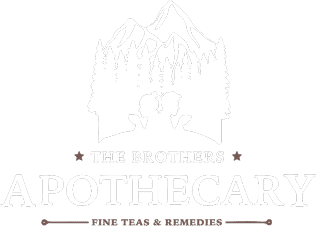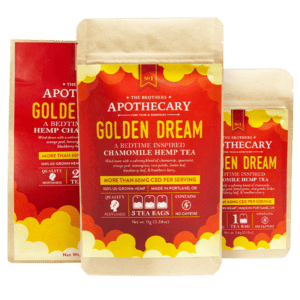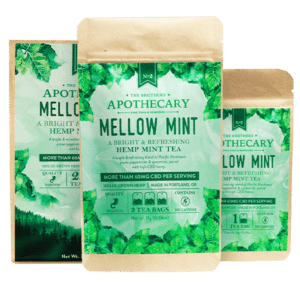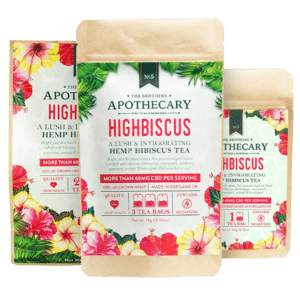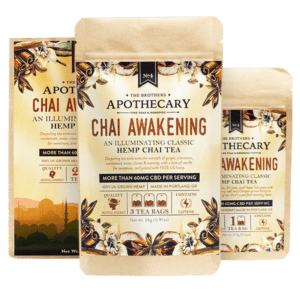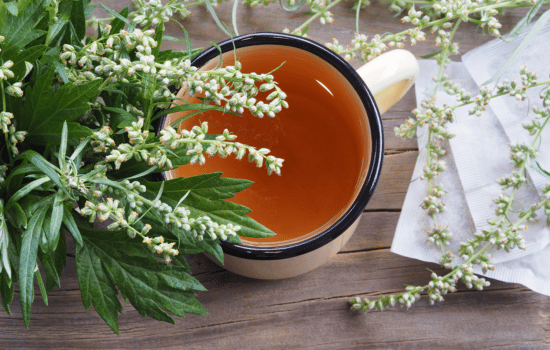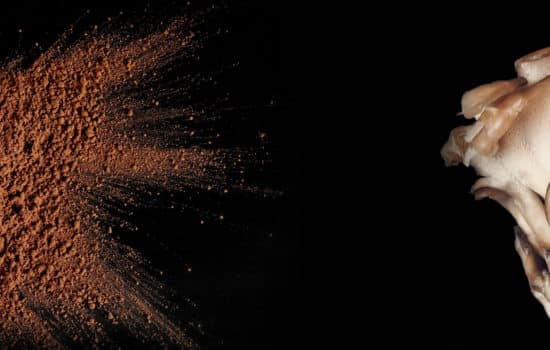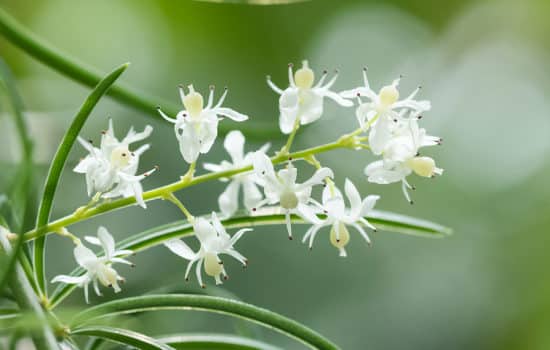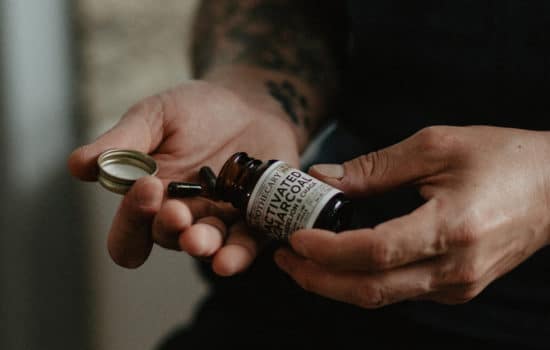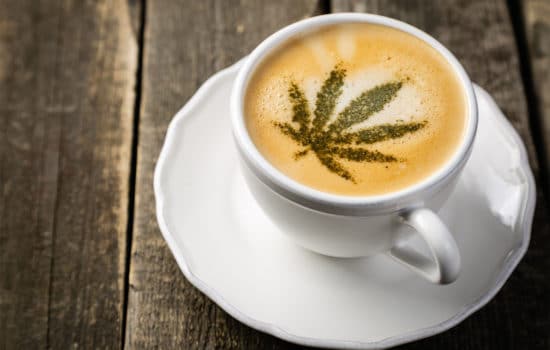For people with prostates, many aspects of health are easy to overlook. But over time, taking extra care to support everything from prostate health to heart health becomes increasingly important.
If you are considering new ways to support your overall wellbeing, you may have heard that introducing certain herbs into your daily diet could be beneficial.
But can herbs have an effect on men, and how do you know which ones may be right for you? At The Brothers Apothecary, we’re here to talk you through it!
Can Herbs Help Improve Men’s Health?
There is some evidence that herbs can support your health by aiding in the regulation of hormones, blood flow, and more. One of the main ways herbs are thought to help the body is through the endocrine system.
Now, we’ve discussed the endocannabinoid system here before, which helps maintain homeostasis within the body by working with cannabinoids to send chemical messages throughout the brain and nervous system.
The endocrine system serves a similar role, except it creates and relies on hormones rather than cannabinoids to send necessary messages through the bloodstream to receptors within organs and tissues throughout the body.
Hormones are chemical messages that regulate many body functions, including stress, pleasure, and libido. Hormones are also responsible for controlling metabolism, sugar levels, growth, and more. Tiny as these messengers are, they play a powerful role in just about every aspect of our health and well-being.
So how do herbs fit into all this? Evidence suggests that some herbs may have the ability to affect hormone levels and interact with the endocrine system.
What Herbs Are Best for Men?
There are several herbs thought to be particularly beneficial for prostate health and beyond.
Ashwagandha
Ashwagandha is a member of the nightshade family, and the root has been used in medicine for over ten thousand years. Ashwagandha is thought to affect stress levels, libido, and fertility.
The cortisol hormone is overproduced during periods of stress, which can cause the body to pivot attention to the stress at hand and away from other vital body functions.
Evidence suggests that ashwagandha may work with the endocrine system to reduce cortisol levels, which can reduce stress and enhance the mood and help encourage the endocrine system to refocus hormone production on anabolic hormones, such as testosterone and DHEA. The anabolic hormones affect libido and fertility, and studies have suggested that ashwagandha can help increase sperm count and motility.
Palmetto
Saw Palmetto is a shrub indigenous to the Southeastern US. While named for its saw-shaped leaves, it is the shrub’s dark berries used in teas and supplements.
Filled with vitamin E and antioxidants that can help reduce swelling, palmetto berries are thought to support healthy prostate function. The prostate is a hormone-producing gland that sits below the bladder in males at birth. It may become enlarged with age, leading to bladder infections, among other potential health issues.
Saw Palmetto, however, may help block the enzymes that can cause prostate growth.
Ginkgo Biloba
One of the oldest trees still alive, the fan-shaped leaves of the Ginkgo Biloba tree are antioxidant-rich and have been used in Chinese medicine for thousands of years. Today, extract from the leaves is most often found in supplements to help increase blood flow and improve mental clarity.
The terpenes found in Ginkgo are thought to improve blood flow by opening blood vessels and keeping our platelets, or smallest blood cells, from clumping together and causing blockages.
Ginkgo Biloba may help relieve stress and improve cognitive function by increasing blood flow to the brain. Improved blood circulation can also increase libido. In fact, research suggests that by helping to open vessels, ginkgo may improve sexual performance.
Nettle
Nettle supplements are believed to help relieve this discomfort by supporting normal hormone levels, prolonging the growth of certain prostate cells, and blocking the 5-alpha-reductase enzymes from converting testosterone into DHT.
Maca
A hardy plant that thrives in the extreme weather found at the Andes mountains of Peru, the maca root has a long medicinal history. Filled with essential amino acids, fatty acids, iron, and calcium, the maca root is used to increase energy, libido, and even fertility.
The glucosinolates found in red maca are thought to play a role in reducing the size of an enlarged prostate. By interacting with the endocrine system, maca may help support libido and improve sperm quality by helping sustain normal levels of reproductive hormones.
Due to its nutty taste, maca root is often consumed as a powder that can be added to smoothies or baked goods and can also be found in capsule form.
Hawthorn
The berries, leaves, and flowers of the hawthorn plant have all been used in herbal remedies. The berries, in particular, have a tart and tangy flavor and are filled with antioxidants thought to support a wide range of health functions.
It is the polyphenol–a powerful and antioxidant-rich plant compound–found in hawthorn berries that makes this herb so sought after. Polyphenol is thought to help control blood sugar levels by supporting the body in the production of the insulin hormone.
Because polyphenol is thought to increase blood flow and lower oxidative stress, hawthorn has also been used to help support heart health and lower blood pressure.
L-arginine
An amino acid found in pumpkin seeds, soybean, poultry, dairy, and more, L-arginine helps make protein in the body and supports healthy blood flow.
Once consumed, L-arginine is transformed into nitric oxide. In this form, L-arginine can help open blood vessels to increase blood circulation and support the endocrine system in producing growth hormones and insulin. Because of this, L-arginine is used in supplements meant to increase libido and support other blood-flow-related functions.
St. John’s Wort
Originating in Europe, St. John’s wort is a flowering shrub that is named for its seasonal bloom around the birthday of John the Baptist.
The plant’s flowers and leaves contain hyperforin, a chemical compound thought to heighten serotonin and noradrenaline activity. Because these hormones help regulate mood, St. John’s wort has been used to help lower stress and support healthy sleep.
Are Herbal Remedies Safe?
While herbal remedies are typically considered safe, there are precautions you want to keep in mind when considering using herbs for medicinal purposes.
Precautions To Be Mindful of
Make sure you only purchase herbal supplements from trusted manufacturers that use high-quality ingredients and are tested by third-party labs.
While natural, herbal products contain strong, active ingredients that can react with other medicines and herbal remedies, so make sure to check with your doctor if you are taking any other medicine before introducing herbal remedies to your routine.
Many herbal products are known to negatively react with blood thinners, blood pressure medication, and aspirin. You should also research possible interactions before combining herbal products.
Herbal supplements can also pose a risk if you have an upcoming surgery.
Herbal products have not been thoroughly tested for children and should not be taken by anyone under 18 unless prescribed by a doctor. You should also check with your doctor if you are over 65, as older adults may metabolize supplements differently.
You should also research the doses that have been tested for safety in clinical studies and follow the instructions on the label of trustworthy products. Do not exceed recommended dosage.
Conclusion
When taken safely and as recommended, herbal remedies may provide a natural boost to your well-being. Every herbal product is different, so make sure you research the specific one you are interested in to understand its potential side effects and interactions before taking it.
Ready to learn more? Don’t forget to check out our blog.
Sources:
Stinging nettle Information | Mount Sinai
The use of maca (Lepidium meyenii) to improve semen quality: A systematic review | Maturitas
Hawthorn Information | Mount Sinai
Dietary supplements for erectile dysfunction: A natural treatment for ED? | Mayo Clinic
Jesse Richardson is the co-founder of The Brothers Apothecary. He's an avid tea drinker and the primary creator behind The Brothers' products. An undergraduate of UCLA for Political Science, Jesse currently studies Medicinal Plants at Cornell University and The International School of Herbal Arts & Sciences.
